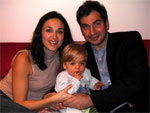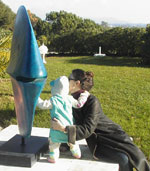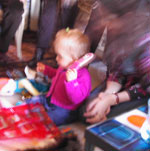Sanfilippo Syndrome: Alliance Sanfilippo
August 2009Alliance Sanfilippo
A catalyst in research on rare diseases
‘My husband and I had never heard of Sanfilippo syndrome before the doctors told us in July 2005 that our dear and beautiful Ornella was suffering from the disease,’ recalls Karen Aiach, co-founder of Alliance Sanfilippo. After the initial shock, she and her husband decided to believe in the possibility of curing this rare disease. First, they did a lot of research and reading about Sanfilippo Syndrome (also known as MPS III). ‘I quickly realised that there wasn’t an organisation exclusively dedicated to Sanfilippo, and yet, I felt it was the only way to get things moving,’ says Karen Aiach. ‘Having a patient organisation at the European or even global level really empowers patients. The more parents get together, the stronger we are to cope with the disease.’ This specific approach by Sanfilippo of focusing on international biomedical research is leveraging the broader, far-reaching role of the lysosomal and mucopolysaccharidosis parent support groups.
husband and I had never heard of Sanfilippo syndrome before the doctors told us in July 2005 that our dear and beautiful Ornella was suffering from the disease,’ recalls Karen Aiach, co-founder of Alliance Sanfilippo. After the initial shock, she and her husband decided to believe in the possibility of curing this rare disease. First, they did a lot of research and reading about Sanfilippo Syndrome (also known as MPS III). ‘I quickly realised that there wasn’t an organisation exclusively dedicated to Sanfilippo, and yet, I felt it was the only way to get things moving,’ says Karen Aiach. ‘Having a patient organisation at the European or even global level really empowers patients. The more parents get together, the stronger we are to cope with the disease.’ This specific approach by Sanfilippo of focusing on international biomedical research is leveraging the broader, far-reaching role of the lysosomal and mucopolysaccharidosis parent support groups.
 Alliance Sanfilippo was created in October 2005 to be the missing link between patients, doctors, researchers and pharmaceutical companies. ‘The UK and the US seem very good when it comes to handling practical issues about living with Sanfilippo syndrome, but in France [where Karen lives], we tend to lag behind in this field,’ says Karen, who looked at how different countries handle the disease. The researchers Karen met were happy to know that at last, there was going to be an international patient organisation representing Sanfilippo, because they felt an international voice was needed for the disease.
Alliance Sanfilippo was created in October 2005 to be the missing link between patients, doctors, researchers and pharmaceutical companies. ‘The UK and the US seem very good when it comes to handling practical issues about living with Sanfilippo syndrome, but in France [where Karen lives], we tend to lag behind in this field,’ says Karen, who looked at how different countries handle the disease. The researchers Karen met were happy to know that at last, there was going to be an international patient organisation representing Sanfilippo, because they felt an international voice was needed for the disease.
‘We don’t want to be just a parents and families forum,’ Karen points out. ‘I think it is essential to encourage and even initiate research, raise  money and help implement clinical trials.’ In fact, towards the end of 2005, Alliance Sanfilippo ordered a scientific audit report about the disease. The work was performed with the active support of a neurobiologist specialised in neurodegenerative diseases. Karen and the young scientist visited many laboratories, companies and hospitals worldwide. ‘We now have a critical and in-depth overview of what exists and what needs to be done in the field of research, information and therapeutic trials. We also have an evaluation of the researchers’ needs, including a global and updated survey of the disease. There are some published works about the syndrome, but a more global analysis would be of great help to know where to place energy and resources.’
money and help implement clinical trials.’ In fact, towards the end of 2005, Alliance Sanfilippo ordered a scientific audit report about the disease. The work was performed with the active support of a neurobiologist specialised in neurodegenerative diseases. Karen and the young scientist visited many laboratories, companies and hospitals worldwide. ‘We now have a critical and in-depth overview of what exists and what needs to be done in the field of research, information and therapeutic trials. We also have an evaluation of the researchers’ needs, including a global and updated survey of the disease. There are some published works about the syndrome, but a more global analysis would be of great help to know where to place energy and resources.’
One of the main obstacles Karen and the families of Alliance Sanfilippo came across was the initial mistrust of some doctors. ‘We want to be an active organisation,’ Karen says. ‘This means learning about the disease, meeting people, getting to know all the technical jargon and being able to discuss the syndrome on a different level than just the patient-doctor one. Some medical professionals don’t like that; they can see us as rivals, even if we explain that we just want to give our kids a future.’
|

 Online Communities For Rare Disease Patients
Online Communities For Rare Disease Patients